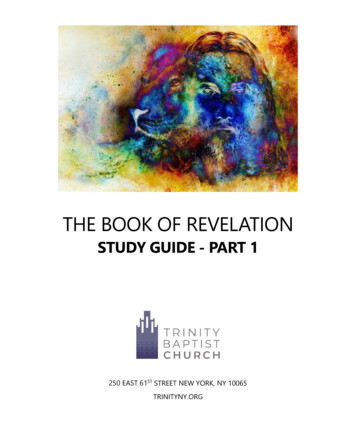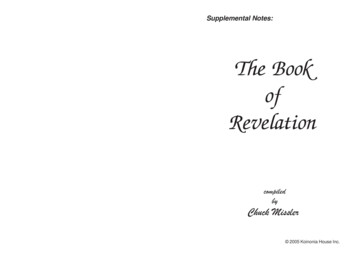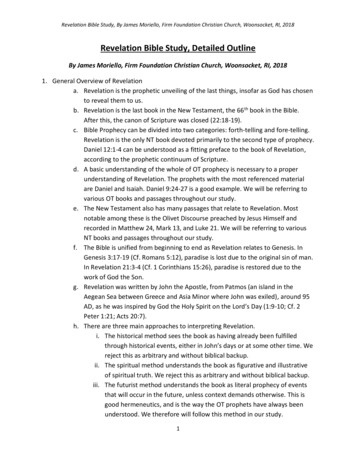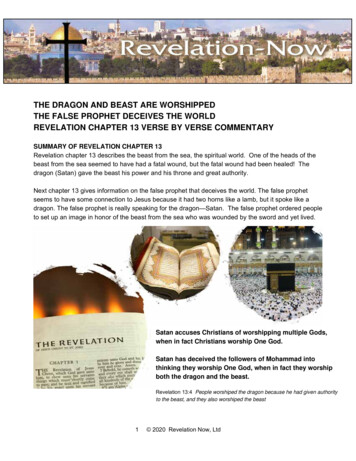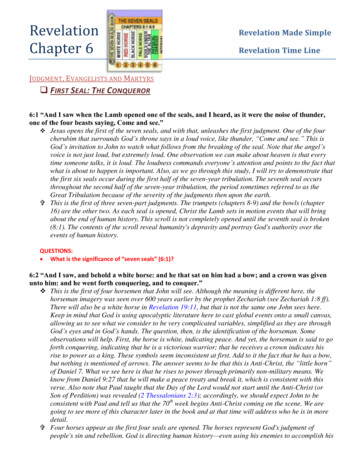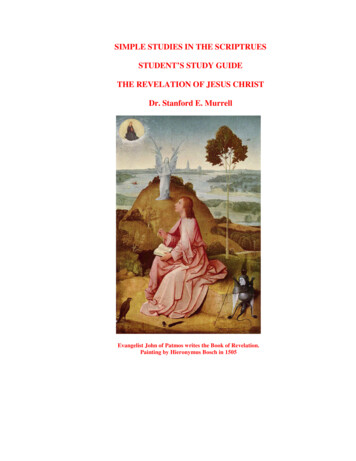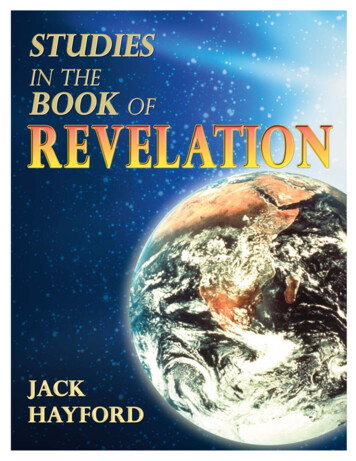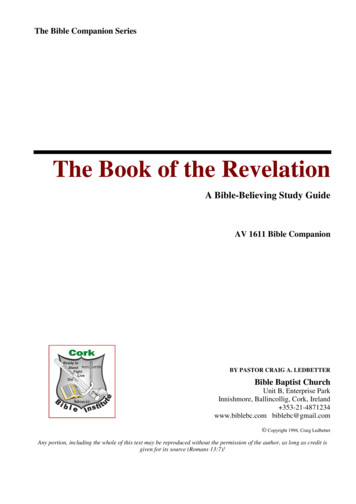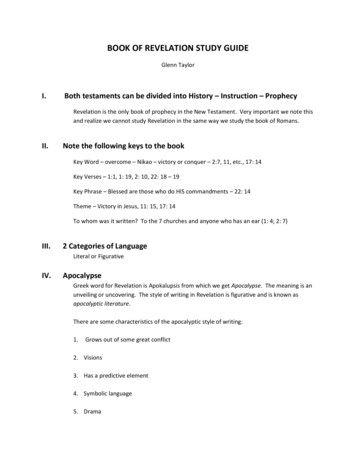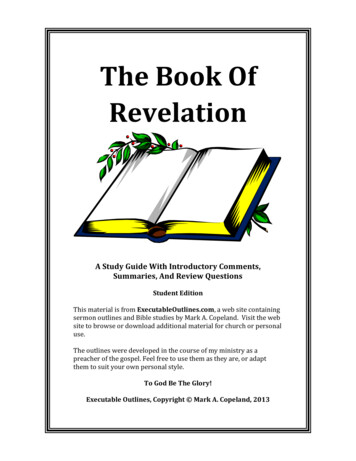
Transcription
The Book of JobBro. Frank Shallieu(2001–2003 Study and Series ofDiscourses in 1984 and 1985)
The following notes on the Book of Job were compiled from a Bible study led byBro. Frank Shallieu from 2001 to 2003 and a series of discourses in 1984 and 1985.They should be utilized with the following understanding:1. Each paragraph preceded by “Comment” or “Q” (an abbreviation for“Question”) was introduced by someone other than Bro. Frank.2. The original study did not follow a prepared text but was extemporaneous innature.3. Although the transcriber tried to faithfully, with the Lord’s help, set forth thethoughts that were presented in the study, the notes are not a verbatimrendering and, therefore, should be considered in that context.4. Finally, Bro. Frank did not review the notes for possible errors that may haveinadvertently entered the text.With this disclaimer in mind, may the notes be a blessing as a useful study guide.
THE BOOK OF JOB(Study led by Bro. Frank Shallieu from 2001 to 2003)Job 1:1 There was a man in the land of Uz, whose name was Job; and that man was perfectand upright, and one that feared God, and eschewed evil.The way the Book of Job opens, “There was a man in the land of Uz,” sounds like thebeginning of a story. The Arabic style was to tell stories that conveyed a lesson, and rabbisoften relate little stories in order to illustrate points of righteousness. However, the Book of Jobis not fiction. Job was a real personality, a living being in the land of Uz.Notice that Job’s lineage is not given. The account simply states that this man lived in the landof Uz. Therefore, we cannot say conclusively whether he was just a resident there at the timeor whether he had come from some other place.The next question is, Who was Uz? Indirectly he was the son of Shem, but he was actually theson of Nahor and Milcah, as clues in the subsequent narrative will show (1 Chron. 1:17; Gen.22:20,21). Incidentally, Rebekah was the granddaughter of Nahor and Milcah.Chronologically speaking, Job was a contemporary of both Joseph and Moses; that is, heoverlapped part of each of their lives. Hence the sequence was Joseph, Job, Moses. We thinkthe Book of Job was written before Moses compiled the first five books of the Bible. In fact,Moses did not begin his public ministry until he was 80 years old, at the time of the Exodus.God had a continuous testimony in the earth both before and after the Flood, and Job’sministry was a witness for God between Joseph and Moses. Thus the time setting for Job’s lifebegan in the Patriarchal Age, which followed the Flood. The Book of Job contains manyindirect evidences that point out this time period.Q: If we assign a date, did Job live at approximately 1700 BC?A: Yes, roughly speaking, for the Exodus was 1615 BC, and 80 years earlier, when Moses wasborn, would be 1695 BC.Job “was perfect and upright.” The word “perfect” is better translated “blameless,” as in theNew International Version. Of course in this earlier period, there was no justification to life, justjustification to friendship with God. In addition, Job “feared [reverenced] God, and eschewed[shunned] evil.”Job 1:2 And there were born unto him seven sons and three daughters.Job 1:3 His substance also was seven thousand sheep, and three thousand camels, and fivehundred yoke of oxen, and five hundred she asses, and a very great household; so that thisman was the greatest of all the men of the east.Job was affluent and very prominent, and the specifics are given. Because the numerics seem tobe symbolic, many writers do not consider the Book of Job to have been written under specificdivine influence—but it was. The following Scriptures prove its authenticity: (1) “Though thesethree men, Noah, Daniel, and Job, were in it [the land of Israel], they should deliver but theirown souls by their righteousness, saith the Lord GOD” (Ezek. 14:14,20). “Behold, we countthem happy which endure. Ye have heard of the patience of Job, and have seen the end of theLord; that the Lord is very pitiful, and of tender mercy” (James 5:11). Job was a real character,approved of God.
2Job had seven sons and three daughters, that is, ten children. “Seven” is a religious or holynumber, and the fact that Job had seven sons shows that God’s providence overrules the lifeexperience of some individuals without interfering with their free moral agency. “Ten” and“seven” are both symbols of completeness, ten being natural and contemporary completeness(ten horns, ten toes, etc.), and seven being sacred and sequential completeness, usually in thesense of chronology or time (seven days in a week or seven stages of the Church, forexample).Q: Was Uz located in the land now called Saudi Arabia?A: Yes. Uz has both a geographical and a lineage connotation. Lamentations 4:21 speaks of theland of Edom as being in the larger area of Uz: “Rejoice and be glad, O daughter of Edom, thatdwellest in the land of Uz.” Saudi Arabia is a large nation, especially when compared with tinyIsrael. Today we think of Saudi Arabia as being mostly desert land, but there is evidence offertility in ancient times.Job had 7,000 sheep and 3,000 camels (10,000 animals). Right away we think of the seven sonsand the three daughters (10 children). The relationship of the numbers has led some toconclude that the book is fictional. However, it is a true story with more substance than aparable, the technique, or method, frequently used by Jesus that was peculiar to the MiddleEast and to Asia in early times. The fact that the count of the animals is given in round numberssimply emphasizes the tremendous wealth Job possessed. Also, it is apparent that the Lord wasblessing Job with a full experience.In addition, Job had 500 yoke of oxen (that is, 1,000 oxen) and 500 she asses. In all, he had 7,000sheep, 3,000 camels, 500 yoke of oxen, and 500 she asses. By coupling the 7,000 sheep and the3,000 camels with the seven sons and the three daughters, we can see that the sheep,mentioned first, were the more important animal. With the 500 yoke of oxen and the 500 sheasses, the first-mentioned oxen were more important. Moreover, the number of oxen and sheasses together was less important than either the 3,000 camels or the 7,000 sheep. In verse 3,therefore, the animals were listed in descending order.In what way was Job “the greatest of all the men of the east”? Of course he excelled intemporal possessions, in wealth, probably having more riches than any other man in that area,but the wording also suggests he was the most notable man “of the east” at that time.Incidentally, the wording places Uz east of Israel. The children of Keturah branched out in thatdirection across Jordan at the southern end of the Dead Sea.When we read that Job “was the greatest of all the men of the east,” we are reminded ofMoses, who was the meekest man living at that time. He was “very meek, above all the menwhich were upon the face of the earth” (Num. 12:3). Job was a most unusual person not onlybecause of his wealth and influence but also because of his moral uprightness.Q: If Job lived contemporaneously with Joseph and Moses, how could he have been called thegreatest man in all the earth?A: There is no problem at all, for Moses was at least 80 years old when he was called themeekest man in all the earth, and Job was dead at that time. Job’s life lapped part of Joseph’slife, covered a gap of 65 years, and then lapped an earlier portion of Moses’ life.Comment: The fact that Job was called the greatest of all the men of the East proves he did notwrite this book, for he would not make such a statement about himself.Reply: That is correct. Even though Job is the main character and the book should be named
3after him, he did not write it.Comment: Verse 1 points out Job’s relationship with God. Then verses 2 and 3 tell of histremendous material substance, which with many would be the root of all kinds of evil, but Jobis called the “greatest.” In other words, he had a balanced character that kept him humble andreverent before God even with his great wealth.Reply: Yes, that was God’s judgment of Job at the end of the book in spite of some startlingthings he may have said. Some of his statements are very helpful to us as Christians and inrealizing how God deals with us.Comment: Verse 8 is a tie-in here. God asked Satan, “Hast thou considered my servant Job, thatthere is none like him in the earth, a perfect and an upright man, one that feareth God, andescheweth evil?”Q: Does the account state that Job was the greatest of all the men of the East because there wereother great men at the same time?A: The “east” was inserted because Job was the “greatest” from the standpoint of not onlywealth and character but also wisdom. The expression “men of the east” usually carried theconnotation of great wisdom. The men of the tribes in the East, even though they were in thehinterland, as it were, had the reputation of being unusual in that there were so many deep,contemplative philosophical thinkers. Much later there were the wise men of the East and thewise men of Teman and of Edom (in the land of Uz). However, one could be very, very wisefrom the natural standpoint but not be in tune with God, so Job was unique for being reverentand in God’s favor, as well as for possessing great wisdom.Job 1:4 And his sons went and feasted in their houses, every one his day; and sent and calledfor their three sisters to eat and to drink with them.Job’s sons “went and feasted in their houses, every one his day.” The term “his day” refers to abirthday; that is, the date of the birth of each son was celebrated. This fact was brought out forseveral reasons; it will have an effect on the narrative of Job subsequently. Only the seven sonswere mentioned, but even excluding the daughters, a birthday was celebrated seven times ayear. The custom was for the celebration to be held in the house of the son whose birthday itwas, and all of the others were invited. Verse 4 sets the stage for us to know Job’s thinking onthese occasions.Comment: Job 3:1-3 proves that “his day” is a birthday. “After this opened Job his mouth, andcursed his day. And Job spake, and said, Let the day perish wherein I was born, and the night inwhich it was said, There is a man child conceived.”Reply: Yes, we were alluding to those verses. Job’s words in that circumstance were a poignantpoint with regard to the whole drama and reality, which were very unusual.Comment: Because of a birthday celebration, all of Job’s children were together when Satancaused the calamity that took their lives.Job 1:5 And it was so, when the days of their feasting were gone about, that Job sent andsanctified them, and rose up early in the morning, and offered burnt offerings according tothe number of them all: for Job said, It may be that my sons have sinned, and cursed God intheir hearts. Thus did Job continually.“When the days of their feasting were gone about” during the circuit of the year—that is, when
4each of the birthdays occurred throughout the year—“Job sent and sanctified them [his sonsand perhaps his daughters too]” and “offered burnt offerings.” The inference is that burntofferings were offered up almost as if they were sin offerings. In our recent booklet entitled“Tabernacle Shadows (Church’s Share in Sin Offering),” we historically enumerated the namesof the sacrifices and showed that they were not defined specifically until Moses came on thescene right after Job.Job “offered burnt offerings according to the number of them all.” Whether he offered sevenor ten animals is a moot point, but he offered at least seven animals in sacrifice, thinking thathis sons may have “sinned, and cursed God in their hearts.” Job’s fear was that in the feastingand drinking, things might get out of hand. Therefore, he tried to compensate for any lack ofmoral restraint that might occur. Job took this action routinely, continually, on each birthday.Job “sent and sanctified them” but in what way? Job was not present during the revelry of hissons and daughters. He was on the sidelines, as it were, making the offerings at his homestead.Job sent a messenger, a servant, to his sons and daughters, but how did he sanctify them? Asprinkling is implied. Later when Moses read the Law, he sprinkled blood on the people.Therefore, Job killed the animal and sprinkled his sons and daughters with the blood. Therewas no codified law at this time, as happened later in the giving of the Law under Moses, butthe offering of animals and the sprinkling of blood occurred in a natural way. Job “rose upearly in the morning” to do the sanctifying before the revelry began. We are reminded of thetime when Abraham got up early in the morning, probably before dawn, to offer Isaac on themount, and Abraham was a predecessor of Job (Gen. 22:3).We can see the unusual character of Job in spite of his wealth, influence, judging, and wisdom.The account will also show that he had administrative responsibilities outside of his family, butthey did not mitigate against his feeling of personal responsibility for the family. Almost allpeople who have outside responsibilities—and in proportion to the importance of their office—give less attention to their wives and families. The consumption of time necessitates thesacrifice. However, Job did not let outside responsibilities infringe on the time for his family.He was a very unusual person.Job 1:6 Now there was a day when the sons of God came to present themselves before theLORD, and Satan came also among them.Verses 6-12 are an allegory, for Satan has been confined in tartaroo ever since the Flood inNoah’s day. He does not have liberty to go up to the heaven of heavens, the Father’s abode.While chapters 1 and 2 talk about real personalities, they are presented in a story fashion tocreate the proper mood and thrust to the lesson that is to be garnered from the Book of Job.This technique is not unusual. For instance, our Lord used parables to teach potent lessons,many of which were prophetic. In the Parable of the Rich Man and Lazarus, Jesus used highlyfigurative language and included the name “Lazarus” to tie in with the fact that Lazarus wouldbe raised from death. Therefore, the allegory was purposely woven into the account of Job togive us the proper perspective of what we might expect as we go into the details. Althoughcalled “The Book of Job,” we can see from this introduction and other parts of the book thatJob would not have written about himself. Obviously, then, the book was written by anotherparty. The book contains clues as to who the amanuensis, or scribe, was. Elihu put together theintroduction, but he could not have done so without the cooperation of Job in supplying certaindetails about his background. We have a similar example with the Apostle Paul, who, before hestarted his ministry, went to Jerusalem to meet the Lord’s brothers to get firsthand informationabout Jesus and the other apostles. His personal, private study about the earlier years of Jesushelped Paul and Luke to introduce the Gospel of Luke.Verses 6-12 are a mixture of fiction and nonfiction. In the allegory, Satan and the sons of God
5went to the place of God’s residence in heaven.Job 1:7 And the LORD said unto Satan, Whence comest thou? Then Satan answered theLORD, and said, From going to and fro in the earth, and from walking up and down in it.From the vantage point of tartaroo, Satan certainly knows what is happening in the wholeearth. As the “god of this world” and the “prince of the power of the air,” he has a lot ofinformation about earth and its affairs (2 Cor. 4:4; Eph. 2:2). No doubt he was aware that Jobwas outstanding and that Job reverenced God. To a large extent, Satan even knows what weare doing in our personal lives. He is aware of geography, places, people, and events, so agreat deal of truth is woven into this semifictional allegory to give us an introduction to theBook of Job. The book actually starts with Job’s experience with his three friends, for that iswhere Elihu originally came into direct contact with Job and listened to the arguments of thethree. However, we would presume that Elihu did not know too much about Job personallyuntil subsequently, when he got information from Job himself and also from other sources.Satan was aware that Job was the greatest personality in the East from various standpoints:wealth, reverence, religion, etc. Thus Satan had more information about Job than Elihu did atfirst. As an introduction, we are getting necessary background information of who wasprimarily responsible for trying Job—it was Satan. We are being transported back thousands ofyears to learn what happened to Job.In the allegory, when God asked Satan, “Whence comest thou?” Satan answered, “From goingto and fro in the earth, and from walking up and down in it.” We are reminded of severalthings.1. “When the unclean spirit is gone out of a man, he walketh through dry places, seeking rest,and findeth none” (Matt. 12:43). Satan, as well as the other fallen angels, know about mankindand have plans as regards the future.2. “And the bay [horses] went forth, and sought to go that they might walk to and frothrough the earth: and he said, Get you hence, walk to and fro through the earth. So theywalked to and fro through the earth” (Zech. 6:7). The activity of the bay horses is related inprinciple to the account here in Job.3. Satan “walked up and down in the midst of the stones of fire” (Ezek. 28:14).Satan came from walking to and fro throughout the earth. The functions of Lucifer and theLogos were quite different. As God’s spokesman, the Logos did not have the liberty thatLucifer had. The Logos was like a sentinel standing at attention, awaiting his Father’s wishes.The Diaglott footnote for John 1:1 illustrates the role of the Logos. A man was the mouthpiecefor the king, who was unseen behind a curtain. The spokesman had to be in the king’spresence. Before Satan fell, he had liberty as Lucifer and, therefore, was used to indiscriminatebehavior in roaming the various planes of being.To a certain extent, even though Satan is bound in chains in tartaroo, he has the means ofcommunication and contact. Spirit beings have capabilities of which we are only beginning totap into now, thousands of years later, with developing technology. Therefore, even thoughbound in chains of darkness, Satan has a roaming spirit that enables him to experience,observe, and see things that are unbelievable to our present human comprehension.Job 1:8 And the LORD said unto Satan, Hast thou considered my servant Job, that there isnone like him in the earth, a perfect and an upright man, one that feareth God, and eschewethevil?
6Verse 8 gives the reason for God’s question to Satan in verse 7. Now Jehovah asked, “Hastthou considered my servant Job, that there is none like him in the earth, a perfect and anupright man, one that feareth God, and escheweth evil?” Even though this situation washypothetical, Job’s character was as described here. There was no one like Job in the earth atthat time. Moses was not yet on the scene. Job was “a perfect and an upright man, one thatfeareth God, and escheweth evil,” and Satan knew about Job’s character. If Satan knows aboutus and we are, relatively speaking, little nobodies, he certainly knew about Job. While thisaccount is fictional, there is much reality in it. The account is an amalgamation of fiction andnonfiction.Comment: Satan previously had great liberty to roam the heavens and the universeuninhibited, but now he is confined to the atmosphere of a tiny planet called Earth and hasbeen given what he wanted: the subjugation of a dying human race.Reply: Through the Bible, the Lord has furnished us with an unusual amount of information.As an archangel, Satan had considerable liberty.Job 1:9 Then Satan answered the LORD, and said, Doth Job fear God for nought?Satan asked a reasonable question: “Does Job fear God for naught?” From Satan’s standpoint,Job was doing well with his great prosperity and material wealth. But in examining character,two people can look at another person and have two opposite views. God looked at Job andsaw a blameless man who loved righteousness and shunned evil with abhorrence. Satan alsolooked at Job but attributed his behavior to a selfish motive. When Jesus was here at his FirstAdvent, some viewed him as a young man with no education, and when he spoke withauthority, they thought that he was presumptuous and high-minded. Others looked at Jesusand thought, “Never [a] man spake like this man” (John 7:46). They did not care about his lackof education, for they recognized him as unusual. Thus two individuals can see the same thingbut get different feelings depending on the heart condition. Satan’s wrong heart condition wasmanifested when he attributed Job’s reverence for God to selfishness for being rewarded.Even prior to the Mosaic Law, the thinking was that those who obeyed God would have betterhealth, a longer life, and prosperity. And of course the Law promised temporal rewards forright doing and obedience. Therefore, Satan, with his wrong heart condition, misconstrued Jobentirely, but God, who reads the heart, knew Job.Job 1:10 Hast not thou made an hedge about him, and about his house, and about all that hehath on every side? thou hast blessed the work of his hands, and his substance is increased inthe land.Job 1:11 But put forth thine hand now, and touch all that he hath, and he will curse thee tothy face.Job 1:12 And the LORD said unto Satan, Behold, all that he hath is in thy power; only uponhimself put not forth thine hand. So Satan went forth from the presence of the LORD.God permitted Satan to try Job to the uttermost through his possessions. Of course God didnot literally say to Satan, “You can do what you want.” This narrative was merely inserted toshow what happened when Satan beheld Job. Satan wants everyone on planet Earth to be hissubjects, and he could see that Job would be a valuable asset to have in his own kingdom.Therefore, he wanted to wean Job’s affection and reverence for God to himself, and hereasoned that taking away Job’s possessions and temporal prosperity would make Jobvulnerable and that then he could win Job to himself. We can see Satan’s motives.
7The information we have been reading was supplied artificially to bring us to a moment oftime in a situation where we can see that God permitted Satan to try Job to the uttermost—butwithout actually having a conversation with him. Those from the Middle East and the Far Eastwould have understood what portion of the narrative was storytelling and what portion wasassorted facts buried in the narrative. As an illustration, Shakespeare’s plays began with anintroduction before the curtain ever opened. In the introduction, he gave a brief account of thefictional characters so that when the curtain opened, the audience would know what was goingon. The main part of the drama was the play itself, not the introduction, but the introductioneliminated the need for any needless discussion of each character while the play was beingenacted. The point is that the introduction in the Book of Job was not unusual, but it is unusualin Western civilization today.Did Job know that God was permitting Satan to test him to the uttermost? No. Job wascompletely unaware of why the calamities were happening to him.Comment: No doubt Satan had already tried unsuccessfully to get at Job, but he realized Godhad put a “hedge about him, and about his house, and about all that he hath on every side”(verse 10). Until the hedge was lifted, Satan did not have power over Job.Reply: Yes, and we know that is true because the account tells us that Job eschewed (shunned)evil. Because Job had already had experiences where he said no to Satan’s temptations, he wascalled righteous and upright.Consider Jesus before the start of his ministry. God knew that Satan would tempt Jesus. Jesusdid not go into the wilderness to be tempted by Satan but to meditate upon the flood ofinformation about his preexistence that came when he was baptized. He entered the wildernessto fast and pray and to contemplate how to begin his ministry, but God knew that in thatsituation, Satan would tempt Jesus—and God permitted the temptations. Just as God permittedSatan to tempt Job, so He allowed Satan to tempt Jesus.We are given wonderful information. How deep a mine God’s Word is! We are givenconfidential information just by reading this account in Job. How much people lose by beingdiverted from the Word itself!Job 1:13 And there was a day when his sons and his daughters were eating and drinkingwine in their eldest brother’s house:Earlier, in introductory verses, we were told that on the birthdays of his children, Job prayedand made burnt offerings to morally protect his family from the vices of loose talk and frompromiscuity in eating and drinking. Now comes the account of an actual occasion on the eldestson’s birthday, when Job’s “sons and his daughters were eating and drinking wine in theireldest brother’s house.” We are getting into the reality, the specifics.Job 1:14 And there came a messenger unto Job, and said, The oxen were plowing, and theasses feeding beside them:A messenger arrived and said the oxen were plowing and the asses were feeding beside them.Notice what animals were involved here. Verse 3 said that Job had 7,000 sheep, 3,000 camels,500 yoke of oxen, and 500 she asses. There is no direct parallelism between the earlier accountof the enumeration of Job’s goods and this out-of-sequence account, which tells about the 500yoke of oxen and the 500 she asses. The lack of sequence shows that this incident is the firststep of something that is being taught.
8Originally, many years ago, we were inclined to think that the 7,000 sheep and the 3,000 camelswere to be grouped together and that the 500 yoke of oxen and the 500 she asses weretogether. But we start with the second grouping.Consider the setting. The servants were busy on the farmland, actually plowing with the oxen,and the 500 she asses were feeding beside them. The account does not state what time of year itwas or what crop the plowing was for. We feel that the she asses correspondingly tookadvantage of the furrows the oxen were plowing by feeding on the debris. In other words, foreach yoke of oxen, there was one she ass feeding behind the plowing.Job 1:15 And the Sabeans fell upon them, and took them away; yea, they have slain theservants with the edge of the sword; and I only am escaped alone to tell thee.All of a sudden, the Sabeans arrived on the scene, killing the servants and kidnapping theanimals. Therefore, in this incident, the animals were stolen, and all of the servants were slainexcept one. Job’s sons and daughters were in the elder brother’s house while this evil wastaking place out on the farmland in the distance. And who was primarily affected by thecalamity? Job—for it was his property and experience.Earlier we speculated that Job was not present at the house of his oldest son but was in his ownresidence. Suddenly a servant burst in the door to inform Job and his wife that a great calamityhad occurred. It is interesting that the only surviving servant informed Job about themisfortune, not the sons and daughters, who were feasting and drinking.The Sabeans were the inhabitants of Sheba, but there were two Shebas and two Dedans. OneSheba and Dedan were in present-day Saudi Arabia, Kuwait, and Yemen. The other Sheba andDedan were in Africa, where the queen of Sheba resided.With regard to the one servant alone escaping and all of the others being slaughtered, Satanmade sure that one would escape to tell Job that the Sabeans had captured his oxen and hisasses. In the allegory that introduces the Book of Job, Satan was given all authority except thatwhich would affect Job’s body. Satan employed the technique that would be most effectiveupon Job; that is, Satan knew the sole surviving servant would take the news to Job, who thenwas evidently in his own house. As we continue to read the account, we will see that in eachincident, all servants were slain except one.Job 1:16 While he was yet speaking, there came also another, and said, The fire of God isfallen from heaven, and hath burned up the sheep, and the servants, and consumed them; andI only am escaped alone to tell thee.The first calamity pertained to the Sabeans, a foreign element, who kidnapped the oxen and theasses. As we read the subsequent reports that came to Job each time a calamity occurred(verses 16, 17, and 19), when the escapee arrived and related what had happened, we are told,“While he [the previous sole surviving servant] was yet speaking.” In other words, exquisitetiming was involved on Satan’s part to make the trials as severe as possible to Job. While oneincident was being reported, another servant arrived to tell of the next incident. What anexcruciating experience for Job!The Sabeans were instrumental in the first affliction upon Job. The second affliction was “thefire of God.” How ingenious and devilish on Satan’s part! When Job heard this report, itsounded as if the God of nature was causing the calamity. The implication intended by Satanwas that God could have stopped the affliction. Therefore, it would seem that God wassomehow involved in the affliction, but of course that was not the case, for He had given Satancarte blanche authority to test Job.
9In reading that the fire of God fell from heaven and consumed the sheep and the servants, wesee that Satan, unless prohibited by God, has power over even the wind. One of Satan’s titles is“prince of the power of the air” (Eph. 2:2). While that title can be given a spiritual connotation,it also describes a physical, or material, power that Satan possesses. Insight into this powercasts light on the storm on the Sea of Galilee when the apostles were in the boat with Jesus. TheMaster ha
THE BOOK OF JOB (Study led by Bro. Frank Shallieu from 2001 to 2003) Job 1:1 There was a man in the land of Uz, whose name was Job; and that man was perfect and upright, and one that feared God, and eschewed evil. The way the Book of Job opens, "There was a man in the land of Uz," sounds like the beginning of a story.


